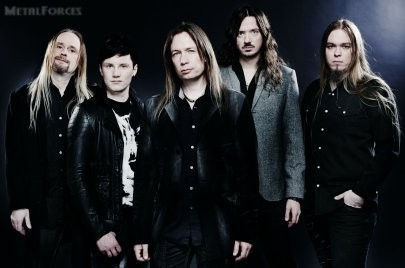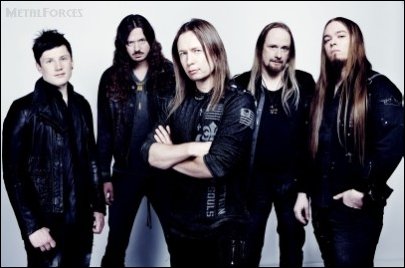
STRATOVARIUS – Standing Their Ground
Anthony Morgan
February 2013

|
Timo Tolkki – longtime guitarist for Finnish power metal outfit Stratovarius – parted ways with the outfit in April 2008 following a 23-year tenure which spanned across Stratovarius’ first 11 full-lengths. Matias Kupiainen was the man’s replacement, who to date has appeared on three studio records; Polaris (May 2009), Elysium (January 2011), and Nemesis (February 2013). Bassist Jari Kainulainen had exited in June 2005 after 12 years, the four-string position subsequently filled by erstwhile Sinergy member Lauri Porra. Keyboardist Jens Johansson describes Stratovarius’ 2013 incarnation as Stratovarius version 3.0.
“The third major change in the structure of the band came in 2008,” he notes. “Everybody in the band writes songs, and we produce the albums ourselves. We try to see what comes from that in terms of material, so I think the only way this album is different is that we all know each other better. When we started all of this – Stratovarius version 3.0 in 2008 – perhaps the guys in the band didn’t know each other so well. I hadn’t actually ever met the guitar player; when Matias flew to Helsinki before writing the Polaris record, I had never met him. I knew that he was a very good player though, because I had seen some videos.
“Polaris – the first one under this new regime – was almost like an experiment. We weren’t even quite sure if we were gonna continue as a band, or how to write the songs. Should we all write them? How should we go about writing material for a new album? Of course, we also didn’t have a label. We didn’t have a record deal. We just financed that record out of our own pockets, made it, and then shopped it to some labels. With this album, of course things were very different. By now of course, everybody knows each other very well. I think we can write better things for each other, and we can incorporate each other better. This record had a smoother production. We already had a record deal as well, and we had already established relationships with different distributors around the world in places like Japan.
“We actually spent a few days in New York talking to the distributor there, so more pieces of the puzzle are in place than when we did Polaris for sure. Like I said though, we allowed ourselves enough time to record it, and we allowed ourselves a budget to record it. We had the budget since we had a record label, plus we had learned a few things from the past. We learnt from our mistakes that we made with Polaris. It’s a refinement of the process of writing albums.”
Less recording time was afforded to predecessors Elysium and Polaris. “That’s where we fucked up,” the ivory-tinkler chuckles. “With Polaris, we didn’t have such a clear idea of what to make. We don’t pre-conceive songs to be one type of a song or another type of a song, because some of this stuff is a bit weird (laughs). With Elysium there were more clear songs, songs that were more streamlined in a way. We had of course a budget and stuff in place before we started recording, but then with Elysium where we fucked up was that we moved the deadline ahead by a month and a half. We wanted to go on tour with a band called Helloween, and they were only touring a certain month. We wanted the record to be out when we were touring with them of course, and because of that we had to rush everything tremendously in order to get it done in time. We changed our plans midway.
“I would say from our experiences of those first two records with this writing team, or 3.0… Now we’ve done Nemesis, I think we’ve taken into account all of the mistakes that we made on the first two albums and didn’t repeat them. The idea was that we just write the songs before we even tell the label that we have a record. We just wrote enough songs, so that we felt comfortable that we could take the best material. In the end we had about two and a half hours of stuff. We just picked from that, and then we told the label ‘Okay. now we might have a record for you in six months or three months. If you want, we’ll record it for you.’ Also with recording, I think we put more ducks in a row and did things more efficiently.

|
“We asked the label if and when they would want a single, and of course in the promotional phase we aren’t bound by another band’s schedule. We are going out on our own on tour, and the promotion is done exactly as it should be timed so that the stories hit the magazines around the time that the story is out. Everything is about a 1,000 times better co-ordinated this time.”
Nemesis wields darker content. “It’s just the material,” Jens muses. “I think it became fairly apparent when we had all of the material collected that some of it was a little bit darker, so when we picked this album title I think everybody’s perception of the whole album… If we had called it something really nice like Mary Had A Little Lamb or something, maybe you would read happier thoughts into the album. There are a lot of dark things on there. I think the album title fits very well, but it isn’t a concept album.”
Commonplace happenings inform the platter’s lyrical content. “Relationships, life, people you encounter, situations you encounter,” the synthesist offers. “There’s a broad spectrum of stuff, and I think everybody’s trying to be deliberately vague sometimes because then you can interpret the lyrics in different ways.”
Jens has approached all Stratovarius keyboard performances in the same fashion since January 2003’s Elements, Pt. 1. “That approach is taking too long, but really paying attention to making a lot of different keyboard arrangements and overdubs,” he analyses. “We then just send those files to the guy who’s mixing, and in this case it was Matias hoping that he keeps a lot of it in. For me, it’s a good way to work. If we approached it a little bit differently this time, I think one thing was that we didn’t have any simulated symphony orchestra types of parts on keyboards, at least on this record. I think if anything, the keyboards on this record are more just keyboards keyboards – they have more of a normal keyboard sound. Just normal stuff instead of orchestral parts. There aren’t so much keyboards on this record, but there’s a little bit. What’s really shining I think is the guitar sound; he put a lot of effort into this.”
Elysium was the last Stratovarius effort to feature drummer Jörg Michael, his tenure drawing to a close in 2012. In November 2010, it was revealed that the sticksman had been diagnosed with a malignant thyroid neoplasm – a variety of cancer – but this wasn’t behind his eventual departure. “And that’s the thing,” the organist explains. “He got sick in 2010 I think it was, but he recovered completely. He had an operation and then some radiotherapy, and he was declared cancer free. He completely kicked its ass, but for him I think he just wanted to stay more at home because we do a lot of touring. One very important thing is that he’s running this booking agency, booking live acts. Of course he’s also booking us still, so we still talk to him quite a lot.
“I think that wasn’t possible to combine anymore with being the Stratovarius drummer though; if we go on a live tour for five weeks and there’s bad phones or limited access to the internet or something, it’s very hard to run a booking agency, to micro-manage an act who’s on the road somewhere else complaining that their pizza is cold or something (laughs). He might have to do a Stratovarius gig in the south of France where there’s no phone connection or something like that. Of course, it isn’t possible to run your company that way, so I think he realised that his membership in the band was too time demanding. His company is actually becoming rather successful and we are still one of his clients, so we still talk to him very often.”
Rolf Pilve was enlisted to fill the void. “We tried out some people, and he was the easiest guy that still played like hell,” Jens divulges. “He’s a really good player, but I think he’s a very easygoing, good-natured kind of guy. It’s also very important when you consider that whoever we brought in would be a full member of the band, and he wasn’t nervous at all. He played well, and everything was easy. Of course, it’s very good to have somebody who’s calm and sitting down in the boat if there’s a storm type of guy. I think for the decision process and the direction of the band, it’s very good to have somebody who’s well-grounded. For me that was important, what kind of person he was. He’s a full member; he has the same amount of power, as far as a lot of things that I do in the band.”

|
‘Castles In The Air’ is one of two compositions the keyboardist authored for Nemesis. “It’s in a minor key, and has some sort of arch shape,” he observes. “The other interesting thing about this is that I was actually convinced that nobody in the band was gonna like it so I just dropped it in this DropBox for the hell of it, just completing it more for myself in a way. I dropped this collection of ideas that I thought related to each other musically in the vocal melodies in the DropBox though, and it turned out that enough guys in the band liked it enough that we actually recorded it. I then of course had to write the lyrics just in time for Timo to sing them. That always pisses him off, because then he might not have enough time to get in the mood or rehearse them. I made the lyrics last as usual because I’m lazy, and they don’t get done until the last minute. It’s about life in a way and how you build certain things in your mind, like concepts or fantasies or whatever.
“With the music though, I left this long solo in the middle. I asked Matias to play something and he played some really strange things in there, so it’s very strange (laughs). It starts off as this very melodic type of thing, and then there’s a long stretch in the middle with a sort of quirkier, playful guitar solo. It then goes back into the song. The middle provides a change of pace. It’s the kind of stuff that people dared to do in the 70s, where you’d have very strange structural parts and perhaps would even be too long. I don’t give a shit though. I think it’s interesting, and has a more epic feel to it. That’s something you wouldn’t normally expect. It’s a normal power metal song with a power metal chorus, and then all of a sudden it has this almost funky, quirky guitar solo in the middle and some weird chords on it. It’s very experimental.
“I put it together, and then everybody said ‘Oh, this sounds kind of nice.’ We recorded it, and now it’s on the album. It’s definitely not done by targeting market groups, or what chorus would be more appealing than some other thing. It’s completely confused, very confused (laughs). I like it though. I think it’s more like how things used to be in the 70s, where people just put whatever the hell they wanted to on there and you get a little bit more character. I think the other guys writing their songs also did the same thing, putting whatever they wanted to into a song. I think you get a very interesting, broad album this way, because you have so many different ideas and different writers. You get a very big variety.”
‘Dragons’ is the second tune Jens penned for the album. “That’s a more standard set of Stratovarius lyrics, which says not to let anybody get you down and to try to keep your chin up, or something like that,” he determines. “It’s almost a pop metal song. I wrote those lyrics at the last minute as well, tearing my hair out, like ‘What the fuck should I write?’ I had some ideas, but just making them fit with the voice and stuff is usually difficult. Everybody leaves it until the last minute. Is it good or not? I don’t know. That’s up to people who listen to it.”
Frontman Timo Kotipelto wrote two numbers in collaboration with erstwhile Sonata Arctica guitarist Jani Liimatainen, namely ‘Out Of The Fog’ and ‘If The Story Is Over’. The pair previously collaborated on October 2012’s Blackoustic. “I like those songs a lot, actually,” the ivory-tinkler enthuses. “I think it’s some really nice stuff, and I can also hear Jani’s influence. I can hear some stuff that you would probably hear on a Sonata Arctica record maybe five or six years ago before he left, some musical ideas. I think it brings diversity, and you just get a little bit broader musical strokes across the whole album. You have more different brains working out their different ideas in a way.

|
“I think the reason he did this with Jani was simply because they had done so much work together with their acoustic shows. They’ve been hanging out a lot together, and they’ve been writing when they’ve had off-time from being at some gig somewhere in Finland as an acoustic duo. There was nothing stranger than that. They just decided to write some songs together.”
Guitarist Matias Kupiainen handled production and mixing duties on Nemesis. “I trusted him to do this on Elysium,” Jens recalls. “Like I said, with Polaris I might not have known him so well. I think maybe he wasn’t… Actually, I know that he wasn’t as experienced with this stuff as he is now of course. With Elysium he took on the whole responsibility of recording and finishing the album, but then we didn’t have enough time so there was another guy that we hired to mix with him. There were two guys mixing it, and it was a little bit of a confusing situation at times. This record is the first one with the band where he’s been responsible for the whole production though, from the first note to the last note and to the last mixing session. He didn’t master it himself, but of course he was there when it was mastered. We gave him this responsibility, because I think by this time we trusted him.
“He proved himself with Elysium that now he understood how the band works, how the fan works, and what it’s about in a way. I trusted him then already, but some of the other guys in the band were very worried. I was just like ‘Don’t worry. It’s gonna sound good.’ With this band you always have to earn trust if you want to do something like this, but he has certainly earnt it by now (laughs). I think everybody is deeply suspicious at first, which is one reason we’ve never used an external producer. As distrustful as we might be of somebody within the band, we’re even more distrustful of anybody outside of the band (laughs). This way we can delegate it, and it’s somebody that we know.
“By now it’s completely clearly that he’s capable of doing it, and understands the fans and the concept of the band. He’s completely indispensable in the process, so I don’t think anybody else is gonna produce so long as he’s in the band. I don’t know though. It also depends on whether he wants to do it. It’s a voluntary thing. We’re not forcing him to do it, but I think he really rather enjoys this kind of work. As a matter of fact, I think he’s actually in the studio again with some other band recording, producing.”
Gyula Havancsák designed the album’s cover artwork. “I just sent the title Nemesis to the artist, and told him to give it his best shot, and see what he comes up with,” the synthesist shares. “He made one sketch for us that was great, but was a little bit too detailed maybe to be on the front as a CD cover. Then he got very busy because some stuff happened to him, so I was like ‘Fuck. We’re gonna have to use this other cover because he doesn’t have time to finish a new one.’ As usual with this guy though, he then came through at the last minute. It was like ‘Okay, this is it. This is great. Thank you.’ We still used the other one he provided us on some special edition cover. He just came up with some image related to the title.”
Nemesis was released in Europe on February 22nd, 2013 via earMUSIC, and subsequently in North America on the 26th through Armoury Records.
Interview published in February 2013.
Related Posts via Categories
- SCOTTISH SICKNESS – A Report On The Scottish Death Metal Scene, Featuring BRAINBATH, PUTRID FATE And RANCID CADAVER (October 2022) | Features / Interviews @ Metal Forces
- LARVAE – Join The Hardcore Cult! (June 2022) | Features / Interviews @ Metal Forces Magazine
- TRENCH FOOT – Sacrificing Morals For Gory Obscenities (June 2022) | Features / Interviews @ Metal Forces Magazine
- L.A. GUNS – Trigger Happy (March 2019) | Features / Interviews @ Metal Forces Magazine
- CANCER – Crimes So Evil (November 2018) | Features / Interviews @ Metal Forces Magazine
- U.D.O. – The Tank Drives On (August 2018) | Features / Interviews @ Metal Forces Magazine
- SIEGE OF POWER – Bleeding For The Cause (August 2018) | Features / Interviews @ Metal Forces Magazine
- MOONSPELL – A Taste Of Live Eternity (August 2018) | Features / Interviews @ Metal Forces Magazine
- MONSTROSITY – Dark Matter Invocation (August 2018) | Features / Interviews @ Metal Forces Magazine
- SATAN – Five Magicians (August 2018) | Features / Interviews @ Metal Forces Magazine
|
|





